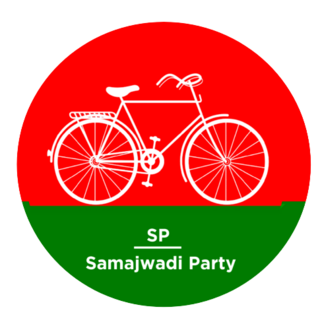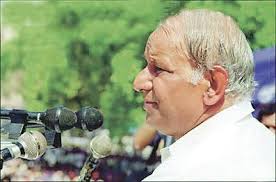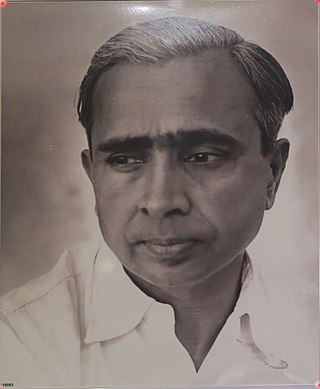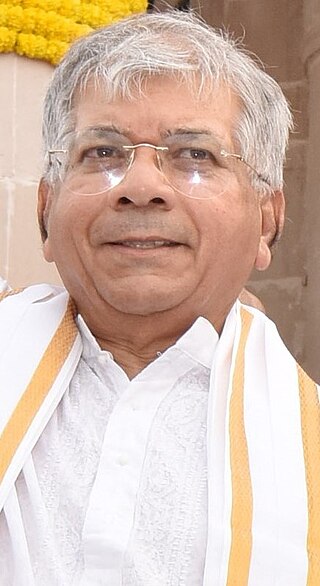
Bhimrao Ramji Ambedkar was an Indian economist, jurist, social reformer and political leader who chaired the committee that drafted the Constitution of India based on the debates of the Constituent Assembly of India and the first draft of Sir Benegal Narsing Rau. Ambedkar served as Law and Justice minister in the first cabinet of Jawaharlal Nehru. He later converted to Buddhism and inspired the Dalit Buddhist movement after renouncing Hinduism.

The Samajwadi Party is a socialist political party in India. It was founded on 4 October 1992 by former Janata Dal politician Mulayam Singh Yadav and is headquartered in New Delhi. The Samajwadi Party is currently led by former Chief Minister of Uttar Pradesh, Akhilesh Yadav.

Kanshi Ram, also known as Bahujan Nayak or Manyavar, Sahab Kanshiram was an Indian politician and social reformer who worked for the upliftment and political mobilisation of the Bahujans, the backward or lower caste people including untouchable groups at the bottom of the caste system in India. Towards this end, Kanshi Ram founded Dalit Shoshit Samaj Sangharsh Samiti (DS-4), the All India Backwards (SC/ST/OBC) and Minorities Communities Employees' Federation (BAMCEF) in 1971 and the Bahujan Samaj Party (BSP) in 1984. He ceded leadership of the BSP to his protégé Mayawati who has served four terms as Chief Minister of Uttar Pradesh.

Kapil Sibal is an Indian lawyer and politician. A designated Senior Advocate, and currently the President of Supreme Court Bar Association (SCBA). He has represented several high-profile cases in the Supreme Court of India and is a Member of Parliament, in Rajya Sabha.

Dr.Udit Raj is an Indian politician and member of the Indian National Congress. He was a Member of Parliament between 2014 and 2019 in the Lok Sabha, representing North West Delhi as a member of the Bharatiya Janata Party but left the party after its first term. He was a civil servant and is the former Deputy Commissioner, Joint Commissioner and Additional Commissioner of Income Tax at New Delhi. Raj is also the National Chairman of the Confederation of Dalit, OBC, Minorities and Adivasi organisations.

National Council of Educational Research and Training (NCERT) is an autonomous organisation of Ministry of Education, the Government of India. Established in 1961, it is a literary, scientific and charitable Society under the Societies Registration Act. Its headquarters are located at Sri Aurbindo Marg in New Delhi. Dr. Dinesh Prasad Saklani is the director of NCERT since 2022.

Viduthalai Chiruthaigal Katchi, formerly known as the Dalit Panthers of India or the Dalit Panthers Iyyakkam, is an Indian social movement and political party that seeks to combat caste based discrimination, active in the state of Tamil Nadu. The party also has a strong emphasis on Tamil nationalism. Its chairman is Thol. Thirumavalavan, a lawyer from Chennai, and its general secretary is the writer Ravikumar.
The National Council of Educational Research and Training (NCERT) is an apex resource organisation set up by the Government of India to assist and advise the central and state governments on academic matters related to school education. The model textbooks published by the council for adoption by school systems across India have generated controversies over the years. They have been accused of using Orwellian tactics to reflect the political views of the party in power in the Government of India. Recently it's been under scrutiny for saffronisation.

Beni Prasad Verma was an Indian politician and a founding member of the Samajwadi Party. A prominent member of the Samajwadi Party, he later joined Indian National Congress and was elected on its ticket to Lok Sabha in 2009. In 2016 he rejoined the Samajwadi Party.

Kesava Shankar Pillai, better known as Shankar, was an Indian cartoonist. He is considered the father of political cartooning in India. He founded Shankar's Weekly, India's Punch in 1948. Shankar's Weekly also produced cartoonists like Abu Abraham, Ranga and Kutty, he closed down the magazine during the Emergency of 25 June 1975. From then on he turned to making children laugh and enjoy life.

Sukhadeo Thorat an Indian economist, educationist, professor and writer. He is the former chairman of the University Grants Commission. He is professor emeritus in Centre for the Study of Regional Development, Jawaharlal Nehru University. He is an expert on B. R. Ambedkar.

Bhaurao Krishnaji Gaikwad, also known as Dadasaheb Gaikwad, was an Indian politician and social worker from Maharashtra. He was founder member of the Republican Party of India and was a member of parliament in both the Lok Sabha and Rajya Sabha. He was a close colleague and follower of human rights leader B. R. Ambedkar. The people of Maharashtra honoured him with the sobriquet Karmaveer and the Government of India awarded him with Padma Shri in 1968 for his dedicated service to society.

M.P. Abdussamad Samadani is an Indian politician, orator, writer and scholar. He knows Malayalam, English, Urdu, Hindi, Arabic, Persian and Sanskrit languages. Samadani was awarded Doctor of Philosophy degree from Jawaharlal Nehru University, New Delhi.

Yogendra Yadav is an Indian activist, psephologist and politician whose primary interests are in the political and social sciences. He was a Senior Fellow at the Centre for the Study of Developing Societies (CSDS), Delhi from 2004 to 2016. He is a former member of University Grants Commission (UGC) and National Advisory Council on the Right to Education Act (NAC-RTE) constituted by Ministry of Human Resources and Development, Govt of India, in 2010. He was a member of the National Executive of the Aam Aadmi Party until 2015.

Prakash Yashwant Ambedkar, popularly known as Balasaheb Ambedkar, is an Indian politician, writer and lawyer. He is the president of political party called Vanchit Bahujan Aaghadi. He is a three-time Member of Parliament (MP). He was a member of the 12th and 13th Lok Sabha of India and twice represented the Lok Sabha constituency of Akola, Maharashtra. He has served in both houses of the Indian Parliament.
Jayant Shridhar Tilak, generally referred to as Jayantrao Tilak, was a politician from Indian National Congress and was a member of the Parliament of India representing Maharashtra in the Rajya Sabha, the upper house of the Indian Parliament. He was also a Member of the Maharashtra Legislative Council. He was the chairman of the house for 16 years.

Ashutosh is an Indian journalist and former politician of AAP. He was the spokesperson of the Aam Aadmi Party. He is the Co-founder and Editorial Director of SatyaHindi, He was previously associated with IBN 7, an Indian news television channel, as a News anchor and managing editor. On 15 August 2018 Ashutosh resigned from Aam Aadmi Party citing his personal reasons.
Although a parliamentary democracy, Indian politics has increasingly become dynastic, possibly due to the absence of a party organization, independent civil society associations that mobilize support for the party, and centralized financing of elections. Family members have also led the Congress party for most of the period since 1978 when Indira Gandhi floated the then Congress(I) faction of the party. It also is fairly common in many political parties in Maharashtra. The dynastic phenomenon is seen from national level down to district level and even village level.The three-tier structure of Panchayati Raj established in the 1960s also helped to create and consolidate the dynastic phenomenon in rural areas. Apart from government, political families also control cooperative institutions, mainly cooperative sugar factories, district cooperative banks in the state, and since the 1980s private for profit colleges. The ruling Bharatiya Janata Party also features several senior leaders who are dynasts. In Maharashtra, the NCP has particularly high level of dynasticism.














